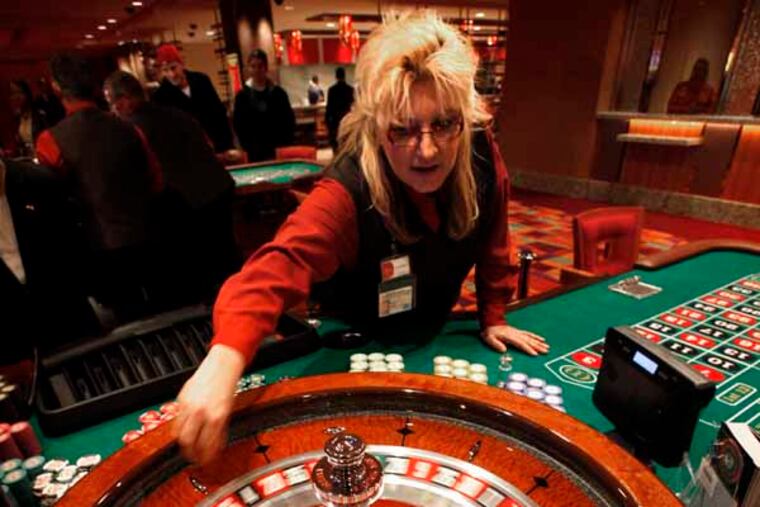Pa. slots revenue continues to rise
Pennsylvania's gambling industry continues to grow, even as casinos proliferate in nearby states. The state Gaming Control Board reported Thursday that gross revenue from slot machines for the 2012 calendar year was nearly $2.5 billion, or 2.7 percent higher than the previous year's $2.41 billion total.

Pennsylvania's gambling industry continues to grow, even as casinos proliferate in nearby states.
The state Gaming Control Board reported Thursday that gross revenue from slot machines for the 2012 calendar year was nearly $2.5 billion, or 2.7 percent higher than the previous year's $2.41 billion total.
Parx led the state's 11 casinos with $384.6 million, up 2.1 percent from 2011. It finished ahead of Sands Casino Resort in Bethlehem ($291.5 million) and Rivers in downtown Pittsburgh ($282.1 million).
Harrah's Philadelphia rounded out the top four at $259.8 million. SugarHouse on Penn's Landing came in eighth, with $190.2 million in gross slots revenue.
The statewide $2.5 billion figure does not include last year's table-games revenue, which will be released later in the month.
Gaming board chairman William H. Ryan Jr. noted that it was the sixth year in a row Pennsylvania had seen an increase in revenue from slot machines. The state's first casino opened in late 2006.
"While competition for gaming dollars from bordering states will continue to escalate, the revenue results from legalized casino gaming in Pennsylvania continue to be strong," Ryan said.
The state reported gross slot-revenue growth last year despite the opening of the $2.4 billion Revel in Atlantic City in April and new casinos in Maryland and Ohio.
New Jersey's December and 2012 year-end casino revenue figures will be released on Thursday.
The industry employs more than 16,000 in Pennsylvania, according to the board.
The state taxes gross slots revenue at 55 percent and table-games revenue at 14 percent. It generated more than $1.3 billion in tax revenue from the play of slots in 2012, which goes primarily toward statewide property-tax relief, purses for the horse-racing industry, and funding for major economic development and community-based projects.
As revenue continues to surge statewide, six groups are vying for the right to build the second casino slated for Philadelphia. Applicants for that license include casino mogul Steve Wynn, gambling powerhouse Penn National Gaming Inc., and Greenwood Gaming and Entertainment Inc., which owns Parx.
The groups will make their first pitches to the seven-member Gaming Control Board on Feb. 12 at the Convention Center, in what is likely to be a yearlong application and vetting process.
While year-end statewide gross slots revenue showed an increase, the casinos actually posted a 2.02 decline in December.
"I think the 2012 numbers were really driven more by action in the beginning of the year, when Revel, Maryland, and Ohio were less of an issue," said gaming analyst John Kempf, of RBC Capital Markets L.L.C. "That said, we are seeing winners and losers starting to emerge: Parx, Sands, and SugarHouse are all showing their ability to grow revenues as their marketing and promotional strategies improve and they increase their offerings."
Harrah's Philadelphia, formerly Harrah's Chester, reported a 3.1 percent decline in gross slots revenue in 2012, and a 4.13 percent decline in December.
Pennsylvania's rate of growth in gross slots revenue exploded from 2007 to 2008, when five casinos were added. But the rate of growth has slowed substantially with only two more casinos, SugarHouse and Valley Forge Casino Resort, added to the mix since September 2010. Valley Forge, the smallest among the 11 venues, was the most recent to open, on March 31.